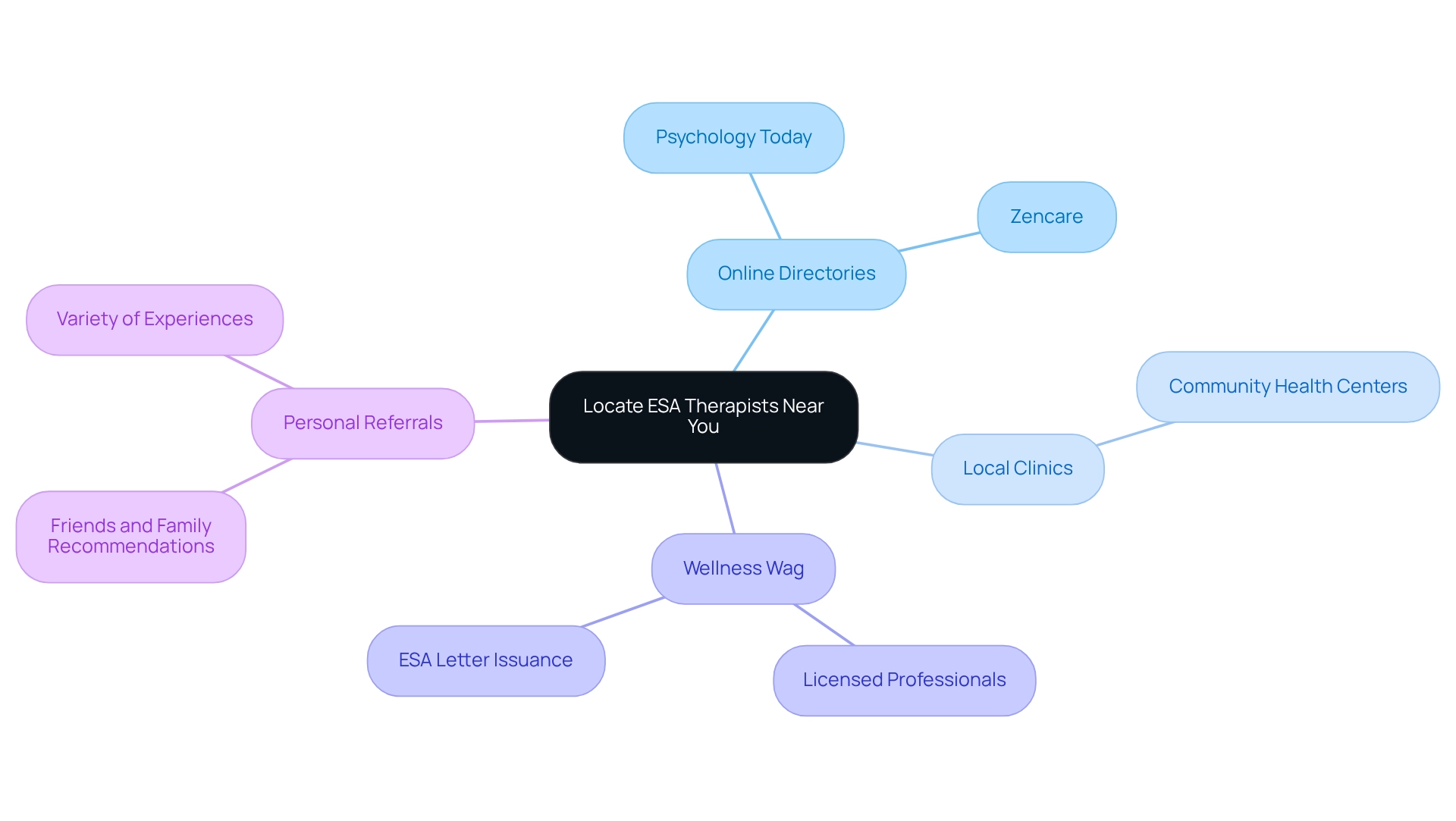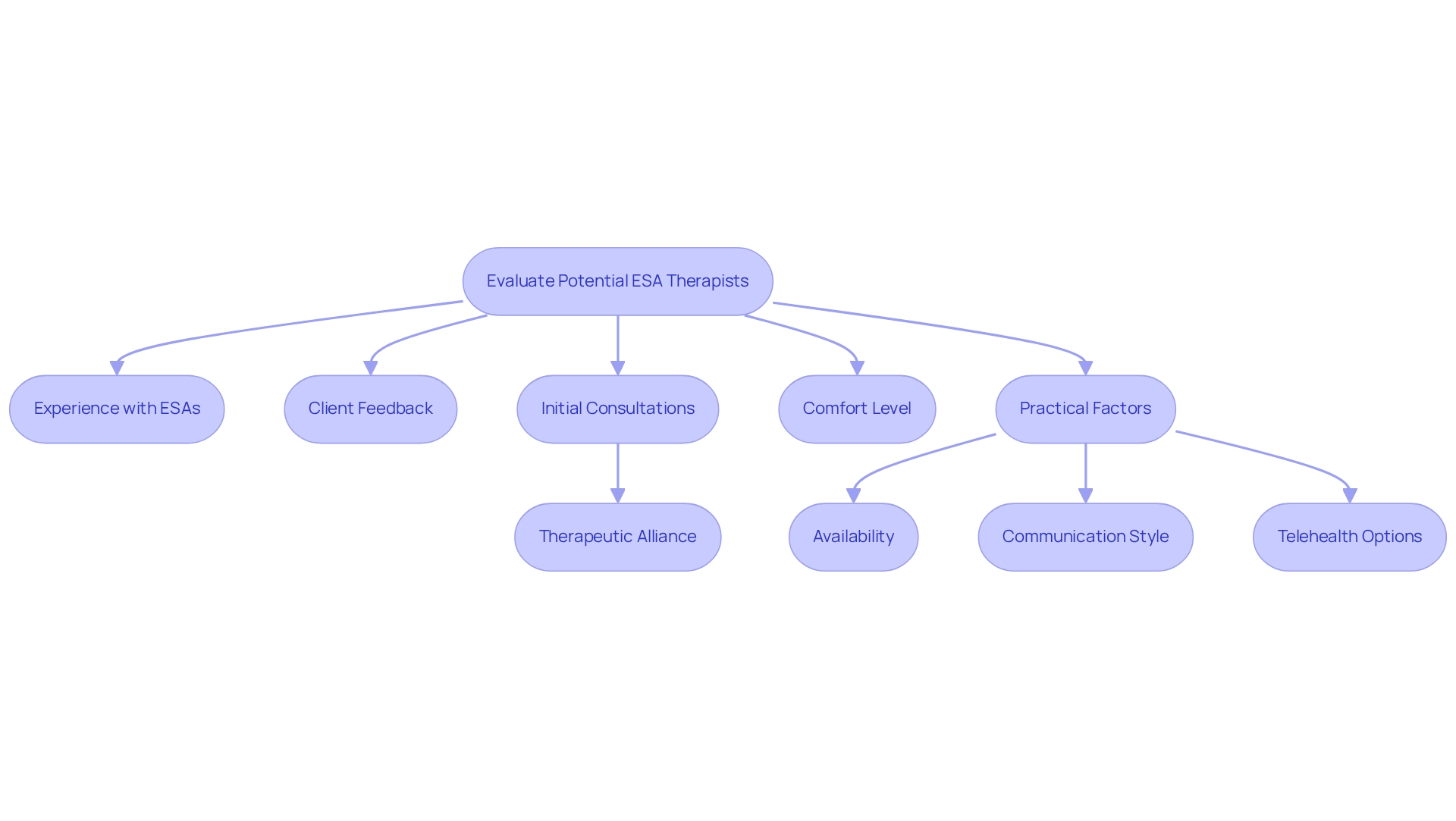

4 Steps to Find an ESA Therapist Near Me
by Lena Park
Last updated: July 8, 2025
Verified and Approved by:
Angela Morris,
MSW, LCSW
Fact Checked

Overview
Finding an ESA therapist near you can feel overwhelming, especially when you’re navigating the complexities of mental health challenges. It’s crucial to prioritize licensed mental health professionals who specialize in emotional support animal evaluations. These experts not only understand the legal requirements for ESA letters but also recognize the emotional weight that comes with seeking help.
As you embark on this journey, consider practical steps to locate these compassionate therapists:
- Utilize online directories designed for this purpose
- Seek heartfelt recommendations from trusted sources
- Evaluate potential candidates based on their experience and client feedback
This process is not just about finding a therapist; it’s about ensuring a supportive therapeutic relationship that truly meets your individual emotional needs. Remember, you are not alone in this journey, and there are professionals ready to support you with understanding and care.
Introduction
In a world where mental health challenges are increasingly recognized, Emotional Support Animals (ESAs) are emerging as vital companions for those navigating emotional and psychological struggles. These unique animals offer comfort and companionship, enhancing well-being without the specialized training required of service animals.
However, the journey to obtaining an ESA involves:
- Understanding the essential role of licensed therapists
- Recognizing the legal distinctions surrounding ESAs
- Following the process of securing the necessary documentation
As the demand for mental health support continues to rise, knowing how to find and evaluate qualified ESA therapists becomes crucial for individuals seeking to enrich their lives through the companionship of these remarkable animals.
Understand the Role of Emotional Support Animals and Therapists
Emotional Support Animals (ESAs) offer vital companionship for those grappling with emotional or psychological challenges, providing comfort and support that can significantly enhance mental health. Unlike service animals, ESAs do not require specialized training; however, to obtain one, you should consult an esa therapist near me for a prescription from a licensed mental health professional. This prescription process is essential, as an esa therapist near me evaluates the individual’s mental health needs to ascertain whether an ESA would be beneficial.
At Wellness Wag, we strive to simplify this journey through our swift evaluation, allowing individuals to express their emotional assistance needs. After submitting the necessary forms, clients are connected with a licensed medical doctor for a personalized consultation and comprehensive evaluation to determine their eligibility for an ESA letter. This approach not only streamlines the process but also ensures that clients receive tailored assistance, all while adhering to HIPAA regulations to protect their health information.
Research shows that interacting with pets can stimulate the release of serotonin and dopamine, which are crucial for enhancing mood and emotional stability. This underscores the therapeutic potential of ESAs in mental health care. Additionally, the growing reliance on educational support assistants is apparent, with experts emphasizing their vital role in promoting public well-being and mental health support.
Therapists, such as an esa therapist near me, not only assess the need for an ESA but also guide clients through obtaining the necessary documentation, which is vital for overcoming challenges related to housing regulations and travel restrictions. For example, individuals residing in pet-restricted housing can advocate for their rights under the Fair Housing Act and Air Carrier Access Act with the appropriate ESA letter.
Real-life stories illustrate the profound impact educational support animals can have on psychological well-being. Many individuals share that their mental health has significantly improved after welcoming an ESA into their lives. Ethical research practices play a crucial role in enhancing our understanding of the benefits of ESAs, ensuring the welfare of both participants and animals involved. The importance of ethical research is highlighted in the case study titled “The Importance of Ethical Research on ESAs,” which stresses the necessity for ethical guidelines in studies involving ESAs. Ultimately, the collaboration between counselors and clients in the ESA prescription process is fundamental to enhancing emotional well-being through the companionship of animals. If you have any questions or concerns about the ESA process, please refer to our FAQs or reach out to us directly.
Identify Qualifications for an ESA Therapist
When searching for an ESA therapist near me, it’s essential to prioritize licensed mental health professionals, such as psychologists, psychiatrists, or licensed clinical social workers. These professionals should possess a robust background in assessing emotional assistance needs and be knowledgeable about the legal requirements surrounding ESA letters. To ensure the therapist’s qualifications, it’s important to verify their licensing information through state boards and check for any relevant certifications that showcase their expertise in this area.
At Wellness Wag, we understand that navigating the process of obtaining an Emotional Support Animal (ESA) letter can feel overwhelming. That’s why we offer a streamlined assessment process designed to help you determine your eligibility. By taking our quick assessment, you can share your unique situation and emotional support needs, allowing us to tailor our services to fit you. After submitting the required forms, you will be connected with a licensed medical doctor for a personalized consultation and thorough evaluation.
Moreover, it’s vital to grasp the legal distinction between ESAs and service animals. A qualified ESA professional should be well-versed in these differences to provide you with accurate guidance. While service dogs are not required to be certified or registered, obtaining certification can lend credibility and ensure that the service dog has received proper training. This understanding is crucial for ESA owners, as service dogs enjoy full public access rights under the Americans with Disabilities Act (ADA). By choosing an ESA therapist near me, a qualified professional, you can secure the necessary documentation to advocate for your rights under the Fair Housing Act and Air Carrier Access Act, ultimately enhancing your quality of life.
Locate ESA Therapists Near You
Finding an esa therapist near me can feel overwhelming, especially when you’re navigating emotional challenges. Start by exploring online directories like Psychology Today and Zencare. These platforms allow you to filter professionals based on their specialties, making it easier to find individuals skilled in emotional support animal evaluations. Additionally, local mental health clinics and community health centers often provide ESA evaluations, so reaching out to them can be a helpful step.
Wellness Wag is another valuable resource that connects clients with licensed professionals specializing in issuing ESA letters. This service simplifies the process, ensuring you receive the necessary documentation efficiently—typically within 24 hours of approval. After placing an order, you’ll receive a confirmation email detailing your purchase, enhancing your overall experience. Moreover, don’t hesitate to seek recommendations from friends or family who have gone through similar experiences; personal referrals can lead to trustworthy options. When seeking suggestions, consider the variety of experiences to ensure a good match.
As the need for counselors is expected to increase by 22% between 2020 and 2030, the availability of ESA practitioners is becoming increasingly important. Currently, around 60% of mental health professionals offer online therapy services, which improves accessibility and flexibility for clients. By utilizing these resources, you can effectively find an ESA therapist near me who meets your needs and supports your emotional journey.

Evaluate and Choose the Right ESA Therapist
When considering potential ESA therapist near me professionals, it’s important to reflect on several key criteria to ensure you find the right fit for your unique needs. Start by evaluating their experience, particularly with Emotional Support Animals and their therapeutic methods. Look for professionals who have a proven track record in this area, as their expertise can greatly influence your experience. Client feedback can provide valuable insights into the effectiveness of their services; high satisfaction rates often indicate a practitioner’s ability to foster a supportive environment.
Schedule initial consultations with your shortlisted professionals to discuss your specific needs and gauge their understanding of ESAs. During these meetings, take note of how comfortable you feel with each counselor. A strong therapeutic alliance is essential for effective assistance, as it can enhance your overall therapeutic experience. Additionally, consider practical factors such as their availability, communication style, and whether they offer telehealth options, which can provide greater flexibility in scheduling sessions. Research shows that a positive therapeutic relationship is one of the most powerful tools for facilitating change, underscoring the importance of finding an esa therapist near me with whom you can truly connect. By thoughtfully evaluating these aspects, you can make an informed decision that aligns with your emotional support needs, knowing that compassionate help is within reach.

Conclusion
The journey to obtaining an Emotional Support Animal (ESA) is a significant one, offering individuals a pathway to enhanced emotional well-being through the companionship of animals. It’s important to understand the role of licensed therapists in this process, as they assess mental health needs and facilitate the necessary documentation for securing an ESA. This collaboration not only ensures compliance with legal requirements but also reinforces the therapeutic value that ESAs can bring to those grappling with emotional challenges.
Finding the right ESA therapist requires careful consideration of their qualifications, experience, and understanding of both the emotional support and legal aspects of ESAs. Utilizing resources like online directories and local mental health clinics can streamline this search, allowing individuals to connect with professionals who can provide tailored support. As the demand for mental health services continues to grow, being proactive in seeking qualified ESA therapists becomes essential for those looking to enrich their lives through the companionship of these remarkable animals.
Ultimately, integrating an ESA into one’s life can lead to profound improvements in mental health, underscoring the importance of ethical practices in the research and implementation of ESA programs. By investing time in finding a qualified therapist and understanding the process, individuals can navigate this journey effectively, ensuring they receive the support and companionship that ESAs uniquely provide. Embracing the companionship of an ESA can truly be a transformative step towards a healthier and more fulfilling life.
Frequently Asked Questions
What are Emotional Support Animals (ESAs)?
Emotional Support Animals (ESAs) provide vital companionship for individuals facing emotional or psychological challenges, offering comfort and support that can enhance mental health.
Do ESAs require specialized training?
No, unlike service animals, ESAs do not require specialized training.
How can I obtain an ESA?
To obtain an ESA, you should consult an ESA therapist near you for a prescription from a licensed mental health professional, who will evaluate your mental health needs to determine if an ESA would be beneficial.
What is the process for getting an ESA letter at Wellness Wag?
At Wellness Wag, after submitting necessary forms, clients are connected with a licensed medical doctor for a personalized consultation and comprehensive evaluation to determine their eligibility for an ESA letter.
How does interacting with pets affect mental health?
Research indicates that interacting with pets can stimulate the release of serotonin and dopamine, which are important for enhancing mood and emotional stability.
What legal rights do individuals with ESAs have?
Individuals with ESAs can advocate for their rights under the Fair Housing Act and Air Carrier Access Act, particularly in pet-restricted housing, with the appropriate ESA letter.
How do therapists assist in the ESA process?
Therapists assess the need for an ESA and guide clients through obtaining the necessary documentation to help overcome challenges related to housing regulations and travel restrictions.
What impact do ESAs have on mental health according to real-life stories?
Many individuals report significant improvements in their mental health after welcoming an ESA into their lives.
Why is ethical research important in the study of ESAs?
Ethical research practices are crucial for understanding the benefits of ESAs while ensuring the welfare of both participants and animals involved.
Where can I find more information about the ESA process?
For more information about the ESA process, you can refer to the FAQs or reach out directly for assistance.
Certify Your Emotional Support Animal Today

Why You Can Rely on Us?
At Wellness Wag, we believe your pet deserves care rooted in both science and compassion. Each article is carefully researched, written in clear language for pet owners, and then reviewed by qualified professionals to ensure the information is evidence-based, current, and practical for real-life care. Our goal is to help you feel confident in making informed decisions about your pet’s health and well-being.
Reviewed by
Angela Morris, MSW, LCSW
Angela is a licensed clinical social worker with 20 years of experience in patient advocacy and community mental health. She has assisted numerous clients with ESA evaluations and brings a deep understanding of disability accommodations, ensuring that all information is accurate, supportive, and practical.

Written by :
Lena Park
Last Updated :
July 8, 2025












